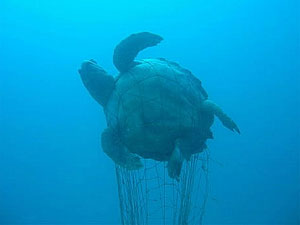|
All were dead and most were decomposing, prisoners of a ghost net - an abandoned gill net - 2 1/2 football fields long.
Authorities who retrieved it in the Atlantic Ocean, about eight miles off St. Lucie Inlet, say it's an all-too-frequent occurrence. Nets are discarded or break free, then trap marine life.
“It's devastating,” said David Godfrey, director of the Gainesville-based Sea Turtle Survival League.
“Nets are one of the worst things floating around in the ocean. They're lethal to air- breathing animals like turtles and dolphins. They suffer a slow, horrible death by drowning.”
Florida's 1995 net ban made nets of this size illegal in state waters, which extend three miles offshore on the Atlantic side and nine miles into the Gulf.
Such nets “are legal in federal waters,” said Mark Oswell, a spokesman for the National Oceanographic and Atmospheric Administration. “But they must be tended.”
The net found Jan. 15 off Jensen Beach was 250 yards long and 100 feet high, says Lee Schlesinger, spokesman for the Florida Fish and Wildlife Conservation Commission.
It was designed to catch sharks and other large creatures, including barracuda, which also were trapped in it.
The fact that this one killed a threatened sea turtle is a violation of the Endangered Species Act, Oswell said.
Those responsible for it face a civil fine of up to $27,500, or a $50,000 criminal fine with possible jail time, depending on whether it was accidentally lost or intentionally discarded.
“We have a couple of good leads,” Oswell said, adding that the net ban has reduced such occurrences across Florida.
“It happens more often in the Pacific,” he said.
Godfrey agrees inshore occurrences of ghost nets have dropped during the past nine years.
“But there are still a lot of compliance problems,” he said.
“You can see trawlers a lot closer than three miles from shore on the Atlantic side and there are a lot more sea turtles on that side, especially during nesting season,” which begins in the spring.
Anyone with information about the net can call the commission's toll-free hot line, 1-888-404-3922, or from a cellphone dial *FWC.
Callers may remain anonymous.
There's also information at the commission's Web site,
http://floridaconservation.org
Reporter Jim Tunstall can be reached at (352) 628-5558.
Top
|
